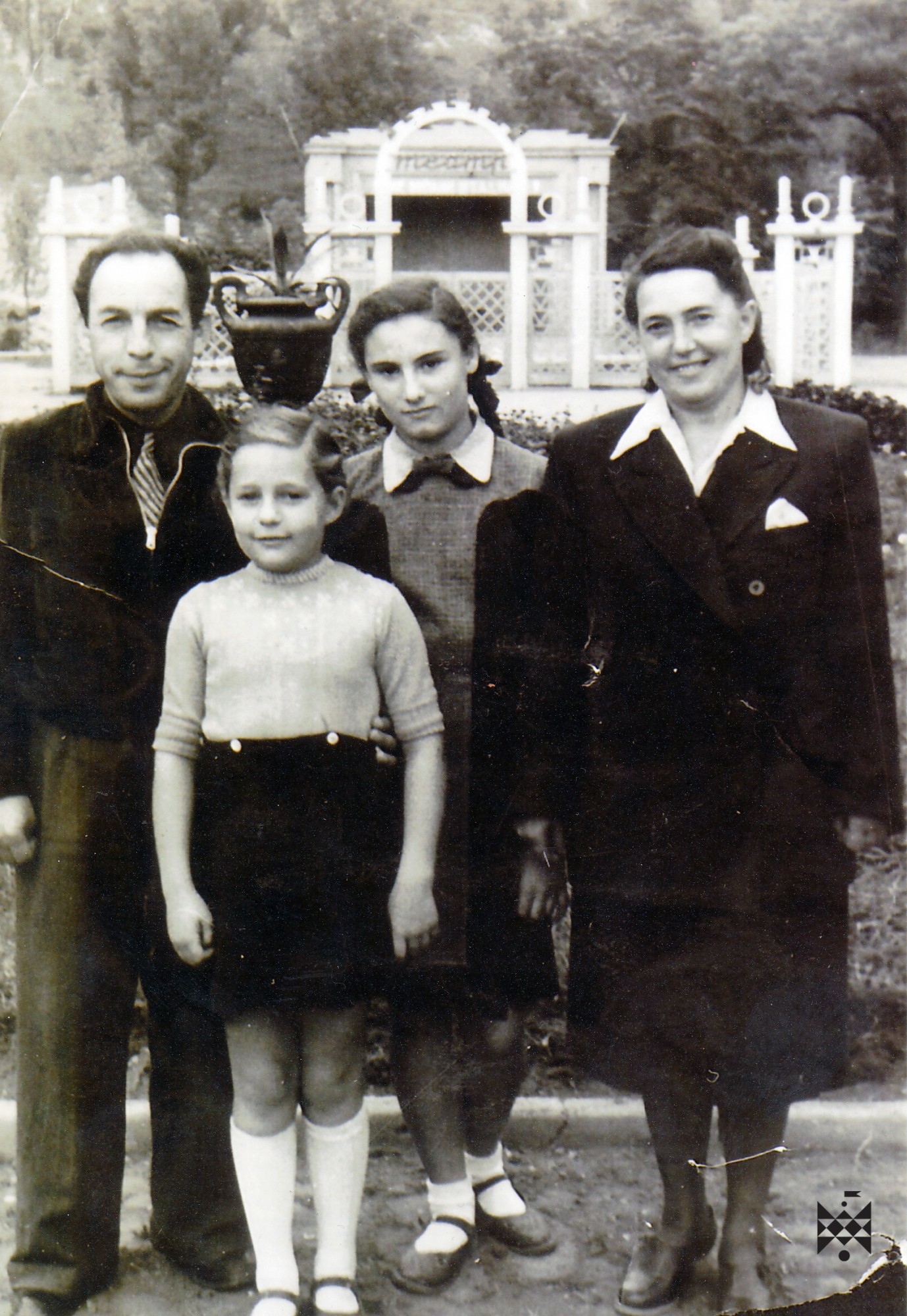Exhibit of the month |
← |
Published: 2023-11-30

The Pomerantz family photograph. 1950. Acc. No. VŽMP 8282-1
From the left: violinist and jazz pioneer in Lithuania Daniel Pomerantz (1904, Šiauliai – 1981), Danutė (Siuzi) Pomerancaitė (Mazurkevich) (b. 1941), Danutė's cousin Rūta Lopianskaitė (Gorinienė), Riva Pomerancienė (Zolkaitė) (1910, Kretinga –?)
When the World War II broke out, the Pomerantz family, together with all the Jews of Kaunas, was imprisoned in the Kaunas Ghetto. At that time, Riva Pomerancienė was pregnant. After some time, they had a baby daughter and named her Suzi.
Danutė Pomerancaitė-Mazurkevich remembers:
I was born in the beginning of war in the Kaunas Ghetto. My father Danielius Pomerancas was a brilliant violinist and my mother had finished child-rearing courses in Germany before the war. I adored my father when he was still alive and I still do adore him now that he is gone. There was one more person whom I truly adored – Mrs. Elena Žalinkevičaitė-Petrauskienė. The Petrauskas family saved me.
My mother has told me about the actions in the ghetto and about the Great Action when the Germans told everyone including children and elderly people to line up and then directed them to go left or right. One side meant life and the other one meant death. We were spared then, although I was still a baby and my mother could barely stand on her feet after the childbirth.
Once, everyone was told to take their children outside of their houses, and my mother decided to keep me indoors. She stuffed me into a pillow. When the Germans came, they searched the apartment, and the pillow with me inside was thrown against the wall in the process. They did not find anything and left. There was an article in English saying that I was a baby that never cried.
/.../ Another time, all children had to be taken away. My father went to a bunker full of people. He said, he had a feeling that something wrong was going to happen, so he took me and ran. Half a minute later, Germans came, threw gas inside the bunker and all the children died.
My parents were aware of a looming disaster. My mother called Elena Petrauskienė, pretended to be her friend Mrs. Karlinskienė (who was my mother’s sister) and met Mrs. Petrauskienė at the Church of St. Nicholas (Church of the Order of St. Benedict) in Kaunas Old Town. She said that she had a daughter who was blond and blue-eyed and did not look like a Jewish child at all. She asked Mrs. Elena Petrauskienė to save that child.
When I watch the Lithuanian film showing the young Mr. Kipras Petrauskas, I look at Mrs. Elena Petrauskienė and their daughter Aušra and I can not imagine how those young and beautiful people with their own children could risk their lives by hosting a Jewish baby. After all, it was a publicly known family!
There were difficulties getting me out of the ghetto. A doctor was found who gave me a lot of sedatives and told us to put me into a potato sack. In this sack, Balys Simanavičius had to take me out of the ghetto. I was given quite a dose of drugs, and I could die. I fell asleep, but I must have felt I was parting with my parents so I kept awaking all the time. Fortunately, I soon calmed down and was carried out of the ghetto successfully.
Upon my arrival to the Petrauskas family house, I was a year and a half old. Thus I became their family member. With the Petrauskas family we went to Palanga and later fled from the Bolsheviks to Germany. I can say that the Petrauskas family loved me so much that I never realised I could have other parents.
While we were in Germany, my father was sent to the Dachau concentration camp. Somehow, he managed to obtain a violin which gave him strength to survive. Without this violin, he said, he probably would have perished.
Once the war was over and the Americans liberated the concentration camps, they found people there and announced the names of the survivors. Among those, was that of Mr. Pomerancas. Elena Petrauskienė wanted to contact the concentration camp immediately and tell him that his daughter was in Germany, but they must have passed each other by five hours. My father, weighing some 30 kilograms, was already walking by foot to Lithuania. There he found my mother who was hiding in the Petrauskas apartment and had miraculously survived.
After the end of the war, our families found each other with the help of the Red Cross and Mr. Kipras Petrauskas. I can still remember the moment of our arrival to Kaunas. I was just a little girl. There were journalists and crowds of people as the family of Mr. Kipras Petrauskas as well as my father were well known persons.
I can still remember my real mother, who had given birth to me, showing up and my real father kissing me. And I remember myself saying to my real father: “You are so small. And this is my dad Kipras Petrauskas. Look, how handsome he is. And look at my mommy!” When we returned to Lithuania, the new start was very hard for me and my parents. You know who your parents are and that they love you and all of a sudden you are told that there also some other parents! It was a disaster for me. Everything seemed completely wrong. I can remember that for about a year, I could not sleep at night. I used to wake up all hysterical and crying: “Take me to Petrauskas, take me to Petrauskas...” And my mother used to take me there in the middle of the night.
In fact, I had two mothers all my life and I called them both mothers: the one that had given birth to me and the one who had saved me. And when me and Jurijus wanted to get married I had to get permissions from two mothers and two fathers, which was not an easy thing to do.
When I was in Germany, my mother had adopted her sister’s daughter Rūta after the war. She had been saved by village people. Thus, I got another sister.
For more information please see:
http://www.issigelbejesvaikas.lt/content.php?id=17881 and http://www.issigelbejesvaikas.lt/content.php?id=17645.
In 1974, the Pomerantz family went to Canada. Violinist Danutė Pomerancaitė-Mazurkevich lives in Boston (USA).
Prepared by Jovita Stundžiaitė-Olšauskienė, curator of the auxiliary collection at VGMJH.
© From the collections of VGMJH
| ↑ | ← |
